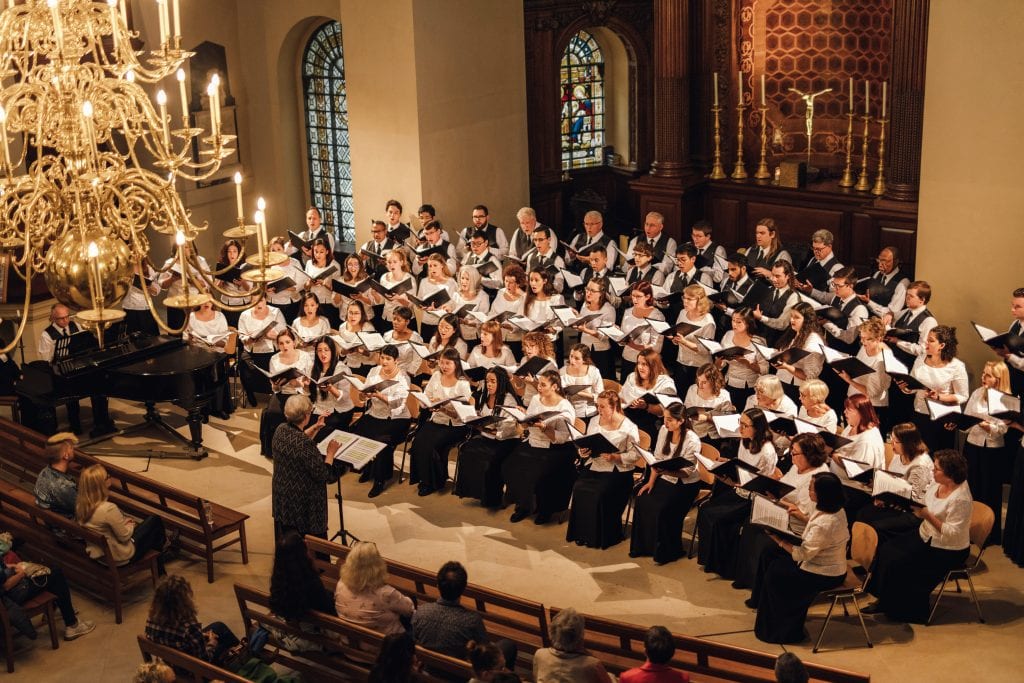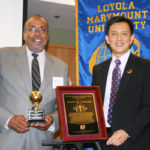
This summer, the LMU choruses performed in London and Paris as part of their 2019 European Choral Tour. This year marked the last year in which Mary Breden, director LMU choral activities, would embark on the trip before her retirement. We asked Gabrielle Poma, a junior music major, to share her experience performing in such a unique and memorable setting.
Whenever I return home from LMU, I’m constantly asked what my summer plans are—do I have an internship? Am I working at a job in my field? I often find it difficult to explain that it’s not always that simple for a music major. So much of the experience that a music student most benefits from relies on performance—the observation of it, the doing of it. Those opportunities for young people are not always abundant or easy to find, but the ones that do land in our laps are unique. It was quite the unconventional response, I’m sure, when I answered questions about summer plans with, “I’m going to Europe with my school choirs.”
Not Your Average Vacation
My description of the trip when people asked afterward was probably quite unconventional as well. I told people it wasn’t the European vacation they might have expected. “Intense” was my frequently used adjective of choice. And it most definitely was—our days were filled with early morning wake up calls, commuting by tour bus, rehearsals, and concerts, all interspersed with short spurts of the tourist activities that one would normally expect to take up full days.
I wouldn’t have changed a single thing about it.
The word “otherwise” came to mind a lot over the course of this trip. I had never been to Europe before, and I don’t know when I would have otherwise. Those ten days encompassed all the major sites a tourist would hope to see: the Tower of London and the Crown Jewels, King’s College at Cambridge, the Roman Baths in Bath, the Eiffel Tower and the Arc de Triomphe in Paris. Even if I were to go again and visit all the same sites, it would never be in the same capacity. I didn’t just see places I wouldn’t have seen otherwise, I performed—performed in the most intricately designed chapels and cathedrals for people I had never met before and would never see again, but with whom, for the briefest moment in time, I shared the rich world of music at LMU.
In Harmony with Her Community
But the biggest “otherwise” was the people. I bonded with fellow students I wouldn’t have otherwise. The students I spent time with were not all music majors—in fact, only a handful of them were. They were communications studies majors, education majors, theatre arts majors, alumni, community members, and so much more. What makes the choruses so distinct is the unique characteristic of extending its membership far beyond current students. The choruses always bring together a unique blend of students, alumni, and community members, but it was especially true this year because of the trip to Europe and Dr. Breden’s retirement. I met people who had graduated as little as five years ago and as many as forty years ago that I would’ve never crossed paths with otherwise. I met people who worked at the university and people whose only tie to the university was the community provided by the choruses themselves. Can anything other than music bring together such a wide variety of people?
On that note (no musical pun intended), it only seems right to share my favorite moment from the trip: our concert at St. George’s Bloomsbury on our last day in London. This might seem like quite the arbitrary selection—it was neither the first nor the last concert of the trip, and I’d be lying if I said this venue was as spectacular as all the others. The space in which we were performing was smaller than Murphy Recital Hall; I could make eye contact with every single person in the audience at least once in the course of a piece. But what we had at this specific concert on this specific night, a direct result of the space, was intimacy.
Greater Than the Sum of Their Parts
I firmly believe that if you’ve “done” music in an ensemble setting long enough—regardless of age or education or occupation—you feel when something bigger than yourself is happening. You know it the way you know your heart is beating at any given moment without having to feel for a pulse. At the rehearsal a few days before the concert at St. George, Dr. Breden decided that it would be enjoyable for us to surround the pews in a large circle when we sang the last two songs. The second to last song in the program that night was “The Ground,” an independent choral piece drawn from Ola Gjeilo’s Sunrise Mass (2008). Though the harmonies are simple, the music absolutely soars. Every time the choruses sing that song together, something happens. In that space, the effect was magnified. You could take in the presence of every single person watching, singing, and, in Dr. Breden’s case, conducting. That feeling of enthrallment was shared among everyone in the room; performers and audience members alike.
I had never quite understood the phrase about a thing being greater than the sum of its parts. How can something possibly be more than its components? How can something be more than what it is? The music of this trip showed me the answer. A piece of music is more than notes on a staff. In the realm of vocal music, it is more than words set to melodies and harmonies. It is even more than the composer who created it. A piece of music is already complex because it is the result of its creator’s life experiences. It is made even more multi-dimensional by any given conductor’s interpretation. But a conductor cannot work without an ensemble; that same piece of music is made infinitely richer by the feelings of its performers, then yet again when they bring it to an audience. Music is a gift that gives of itself over and over. On this trip, in those beautiful places with that unique combination of people, a specific confluence of elements that will never replicate themselves again, music was a gift that I received over and over.








